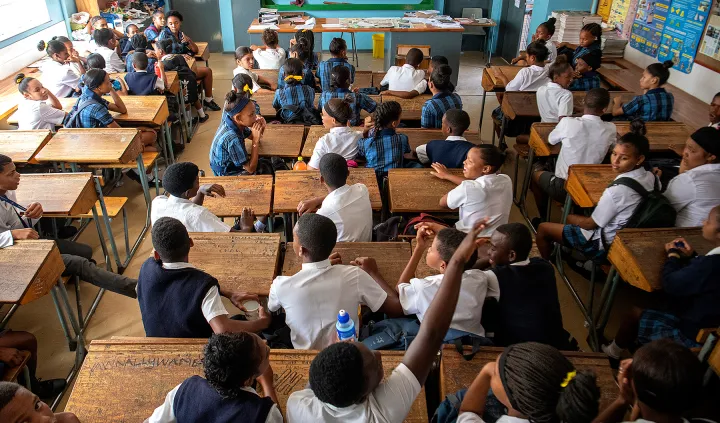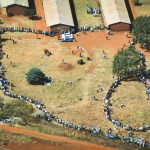BACK-TO-SCHOOL BLUES
Western Cape Education Department strives to place 2,500+ learners as new school year begins

As the 2024 academic year commenced on Wednesday, school placements were still being sought for 2,636 Grade 1 and 8 learners in the Western Cape.
The Western Cape Education Department (WCED) has confirmed that it is still seeking to place 2,636 Grade 1 and 8 learners in schools, with more late applications for learner placements expected to roll in over the coming weeks.
By 11 December 2023, the WCED had allocated places for 99.43% — 120,778 — of the learners whose caregivers had applied for them to join Grade 1 and 8 classes in 2024, according to Bronagh Hammond, spokesperson for the department.
“However, since that date, and while schools have been closed for the holidays, we have received new applications for learners whose parents had not previously applied,” she said.
“We received 609 new, extremely late applications in the first 10 days of January 2024, and placement is currently in progress for 2,636 Grade 1 and 8 learners.”
The City of Cape Town Municipality, particularly the Metro East and Metro North areas, was facing the highest number of unplaced learners in the province, Hammond said. She explained that it had been difficult to finalise places for learners while schools were closed. Now that schools have reopened, the WCED is in discussions with school governing bodies to confirm placement options.
Lungelo Jonas, an organiser with the nonprofit organisation Equal Education, was in Nyanga, Cape Town, on Wednesday assisting parents whose children had not been placed in schools. She told Daily Maverick that most of the children without placements were high school learners.
“There are so many learners that are not placed yet here in Nyanga. Parents are moving from one school to another school just to … ask if there is a space for them to place their learners, but the schools are sending them back to the Department of Education,” she said.
According to Jonas, many parents say they did submit online applications to have their children placed in schools last year, but did not receive a response from the WCED.
“One parent mentioned that she didn’t get the placement to the school that she applied to, but then what [the WCED] did was they just placed the learner in Langa, and [the family] lives in Gugulethu,” Jonas said.
“[The parent] said to the Department of Education that she can’t afford to take the child from Gugulethu to Langa, so she can’t take that school. They said that she must go to schools around Langa, Gugulethu and Philippi to see if there is a space for the child, because there’s nothing that they can do.”
When asked why there was overcrowding in Western Cape schools, Hammond said an additional 19,000 learners were enrolling in the province’s schools each year, on average. She added that many new learners came to the province from the Eastern Cape seeking better education opportunities.
“Applying late also complicates matters… The challenge with extremely late applications is that we do not know how many new applications we will receive, where the extremely late placement will be required, the grades, language and ages of the learners, and the specific subjects and specialised needs of the learners,” she said.
“We ask for patience as we make progress in placing these extremely late applicants. We cannot always predict where and when these late applicants will arrive, and this has made planning our resource allocation … extremely difficult.”
Systemic issues
The struggle to find places for all learners at the beginning of the school year is not a new one. This time last year, the WCED was still seeking places for 955 learners, according to Hammond.
Basil Manuel, the executive director of the National Professional Teachers’ Organisation of South Africa (Naptosa), said there was a growing problem across the country when it came to placing learners, particularly in urban areas.
“Urbanisation, unemployment and the belief that better chances exist in urban areas is one reason. There is huge migration into the big metros… The demand results in stopgap measures where schools have to take additional learners,” he said.
“The quality of learning and teaching suffers. It becomes the difference between crowd control and teaching. The impact on teacher mental health is a ticking time bomb.”
This sentiment was echoed by Jonas, who said that finding schools for unplaced learners didn’t solve the larger problem of overcrowding.
“In some schools, some teachers … expressed that they had to take learners and then they had to teach about 50 learners. And you know that you can’t teach 50 learners as one teacher because there’s a lot of distractions and it’s an overcrowding issue,” she said.
In the Western Cape, the provincial education department has undertaken to build new schools at an accelerated rate through its “Rapid School Build programme”. It is building 10 new schools and three replacement schools in the 2024 school year, according to Hammond.
“We are currently putting the finishing touches on our new junior high schools in Belhar, Fisherhaven and Kwanokuthula as part of our Rapid School Build programme,” she said.
“Following over a year of being blocked from construction by criminal activity, we have laid the foundations at the Blueridge site, where we are building a new primary and high school for the community of Wallacedene.
“Lwandle Primary School in Somerset West is also back on track following disruptions at the site. We are working hard to finish these delayed projects as soon as possible.”
Hammond emphasised that these efforts were underway despite a “massive R716.4-million blow” to the education budget in the Western Cape — a reference to the severe spending cuts that emerged from the National Treasury’s Medium-Term Budget Policy Statement in November 2023.
Read more in Daily Maverick: Treasury has again neglected South Africa’s most economically vulnerable, say civil society organisations
According to the education adjustment budget speech delivered by the Western Cape MEC for Education, David Maynier, in November 2023, the National Department of Basic Education has cut the WCED’s conditional grants by R179.4-million. This included a R156.9-million cut to the Education Infrastructure Grant. DM




















 Become an Insider
Become an Insider
Comments - Please login in order to comment.